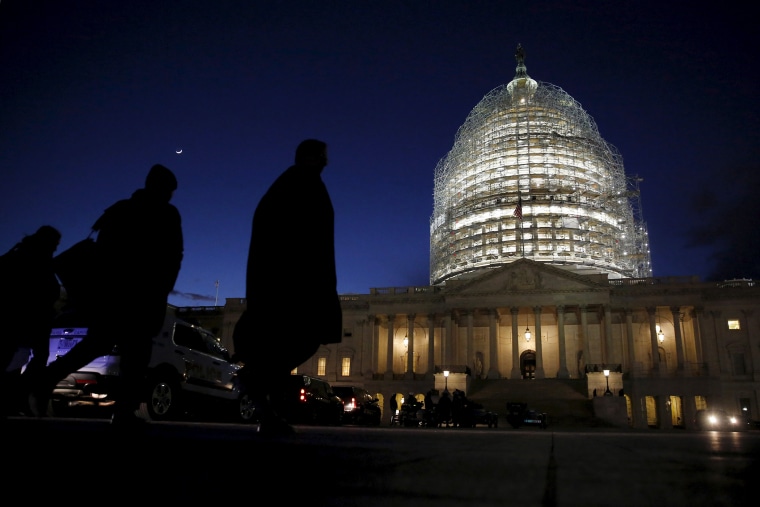Over the weekend, as news of Supreme Court Justice Antonin Scalia's passing spread, Senate Republicans quickly coalesced around a simple strategy: No.
No, President Obama shouldn't bother nominating a prospective justice. No, the nominating process outlined in the Constitution doesn't matter. No, the Senate will not fill the vacancy until 2017. No, GOP senators are not concerned about the consequences. No, Republicans aren't embarrassed by the radicalism of a blockade against a nominee that doesn't even exist yet.
But as this week has progressed, cracks in the partisan facade have emerged. Politico reports today, for example, that Sen. Dean Heller (R-Nev.) is "breaking sharply with his party's strategy."
The statement from the purple state senator is the most direct rebuttal to Senate Majority Leader Mitch McConnell's plans to completely block a Supreme Court nominee. Though Heller admits that a nominee is unlikely to be confirmed this year, he encouraged Obama on Wednesday "to use this opportunity to put the will of the people ahead of advancing a liberal agenda on the nation's highest court." "The chances of approving a new nominee are slim, but Nevadans should have a voice in the process," Heller said.
It'd be a real stretch to suggest the Nevada Republican has adopted a responsible and mature posture on the issue. He really hasn't. In fact, Heller suggested President Obama should consider nominating Nevada Gov. Brian Sandoval -- a Republican and former judge -- to the Supreme Court.
So why does this represent a "sharp break" with the Senate Republicans' gambit? The easiest way to look at this is to recognize the groups GOP senators are falling into.
Most Republicans, including Senate Majority Leader Mitch McConnell (R-Ky.), believe the White House shouldn't even bother nominating anyone, since he or she would be ignored, no matter what. Some, including Dean Heller and Sen. Lindsey Graham (R-S.C.), have suggested the president can at least try to send a nominee to the Hill. Some, including Sen. Chuck Grassley (R-Iowa), have argued in support of the GOP blockade, but believe a presidential nominee might at least get a fair, public hearing.
Some, including Sens. Susan Collins (R-Maine) and Ron Johnson, have said they could imagine maybe voting for an Obama nominee. Some, including Sen. Thom Tillis (R-N.C.), are comfortable with a partisan blockade, but recognize that a strategy built on overt obstructionism might be bad for the GOP.
I can appreciate why some of these distinctions exist only in nuance. It's likely, if not certain, that many of the Republicans who are balking with their party's current strategy are solely concerned about the public relations and "optics." The practical differences between "no" and "pretending to be a maybe but in reality no" are effectively non-existent.
But it's nevertheless true that GOP senators have grown increasingly more divided every day since Saturday night. The odds of a capable, qualified nominee getting past an indefensible Republican blockade remain low, but the fact that the Senate majority party still doesn't quite know what it intends to do leaves the door ajar, if only a little.
